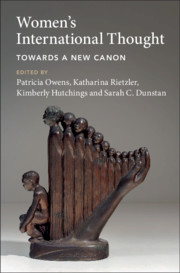Book contents
- Women’s International Thought: Towards a New Canon
- Women’s International Thought: Towards a New Canon
- Copyright page
- Contents
- Preface and Acknowledgments
- Introduction
- 1 Field and Discipline
- 2 Geopolitics and War
- From Influences of Geographic Environment on the Basis of Ratzel’s System of Anthropo-Geography (1911)
- From “The Fascist World War (Ethiopia and Spain)” (1935)
- From The Mediterranean in Politics (1938)
- From Toward a New Order of Sea Power (co-authored with Harold Sprout) (1940)
- From “What We Must Now Do about India” (1942)
- From “The Question of War” (1958–1959)
- From Pearl Harbor: Warning and Decision (1960)
- From Vietnam (1967)
- Ellen Churchill Semple
- Sylvia Pankhurst
- Elizabeth Monroe
- Margaret Sprout
- Claudia Jones
- Hannah Arendt
- Roberta Wohlstetter
- Mary McCarthy
- 3 Imperialism
- 4 Anticolonialism
- 5 International Law and International Organization
- 6 Diplomacy and Foreign Policy
- 7 World Peace
- 8 World Economy
- 9 Men, Women, and Gender
- 10 Public Opinion and Education
- 11 Population, Nation, Immigration
- 12 Technology, Progress, and Environment
- 13 Religion and Ethics
- Index
Hannah Arendt
from 2 - Geopolitics and War
Published online by Cambridge University Press: 12 April 2022
- Women’s International Thought: Towards a New Canon
- Women’s International Thought: Towards a New Canon
- Copyright page
- Contents
- Preface and Acknowledgments
- Introduction
- 1 Field and Discipline
- 2 Geopolitics and War
- From Influences of Geographic Environment on the Basis of Ratzel’s System of Anthropo-Geography (1911)
- From “The Fascist World War (Ethiopia and Spain)” (1935)
- From The Mediterranean in Politics (1938)
- From Toward a New Order of Sea Power (co-authored with Harold Sprout) (1940)
- From “What We Must Now Do about India” (1942)
- From “The Question of War” (1958–1959)
- From Pearl Harbor: Warning and Decision (1960)
- From Vietnam (1967)
- Ellen Churchill Semple
- Sylvia Pankhurst
- Elizabeth Monroe
- Margaret Sprout
- Claudia Jones
- Hannah Arendt
- Roberta Wohlstetter
- Mary McCarthy
- 3 Imperialism
- 4 Anticolonialism
- 5 International Law and International Organization
- 6 Diplomacy and Foreign Policy
- 7 World Peace
- 8 World Economy
- 9 Men, Women, and Gender
- 10 Public Opinion and Education
- 11 Population, Nation, Immigration
- 12 Technology, Progress, and Environment
- 13 Religion and Ethics
- Index
Summary
Surely no one now doubts that, as the logical outcome of such possibilities, a third world war can hardly end in anything but the annihilation of the loser. We are already so in the thrall of total war that we can scarcely imagine a war between Russia and America in which the American Constitution or the current Russian regime would survive defeat. But that means that a future war will not be about a gain or loss of power, about borders, export markets, or Lebensraum, that is, about things that can also be achieved by means of political discussion and without the use of force. It means that war has now ceased to be the ultima ratio of negotiations, whereby the goals of a war were determined at the point where negotiations broke off, so that all ensuing military actions really were nothing but a continuation of politics by other means. What is now at stake is something that could, of course, never be a matter for negotiation: the sheer existence of a nation and its people. It is at this point – when war no longer presumes the coexistence of hostile parties as a given and no longer seeks simply to put an end to the conflict between them by force – that war first truly ceases to be a means of politics and, as a war of annihilation, begins to overstep the bounds set by politics and to annihilate politics itself.
- Type
- Chapter
- Information
- Women's International Thought: Towards a New Canon , pp. 110 - 116Publisher: Cambridge University PressPrint publication year: 2022



